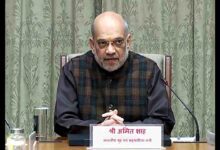ISRO Chairman V. Narayanan: At least 10 satellites for strategic purposes are working continuously round the clock
Imphal: According to V. Narayanan, chairman of the Indian Space Research Organization (ISRO), at least ten satellites are operational around-the-clock for strategic reasons to protect the nation’s population. Speaking at the Central Agricultural University’s (CAU) fifth convocation event in Imphal yesterday, the head of ISRO emphasized the organization’s work to protect the nation in the face of tensions with Pakistan.

“At least 10 satellites are continuously working round-the-clock for the strategic purpose of ensuring the safety and security of the citizens of the country,” stated the chairman of ISRO.
“Everyone is aware of our neighbors. We must use our satellites to serve if we want to guarantee the security of our nation. We must keep an eye on our 7,000 kilometers of coastline. We must consistently monitor the entire Northern region. We can’t do it without drone and satellite technologies,” V. Narayanan said.
The region has mostly stayed tranquil over the intervening night of May 11 and May 12, the Army said, after the turmoil and all the clashes that had kept the areas along the northern and western International Borders (IB) up throughout the night for the previous several days.
The Army claims that there have been no reports of violations of the cessation of hostilities in the Jammu and Kashmir region or other regions near the Indian border.
According to the army, this was the first quiet night in a few days after Pakistan responded to India’s Operation Sindoor, which was launched in retaliation for the April 22 terror attacks that destroyed important terror sites in Pakistan and Pakistan-occupied Kashmir (PoK) with cross-border firing, heavy artillery shelling, and drone attacks.
Pakistan has been heavily shelling and attempting drone strikes in the border areas of Jammu & Kashmir, Rajasthan, Punjab, and Gujarat over the last few days to disturb the tranquility in the area. However, the Indian air defense system effectively neutralized the Pakistani strikes.
The Indian Armed Forces responded by confirming the destruction of eleven air bases within Pakistan and severely impairing their military capability.
The main results of India’s Operation Sindoor were jointly announced by Vice Admiral A. N. Pramod, Director of Naval Operations; Lieutenant General Rajeev Ghai, Director of Military Operations; and Air Marshal A. K. Bharti, Director of Air Operations, during a news conference on Sunday.
Lieutenant General Rajiv Ghai reported that he had a conversation with his counterpart that led to the cessation of air intrusions and cross-border firing by both neighboring countries. He claimed that the Pakistani army had broken these agreements a few hours after the ceasefire. He said that the proposal to end hostilities came from the Pakistan DGMO.
“After he suggested that we end hostilities, I spoke with the Pakistani DGMO at 15:35 yesterday, and as a consequence, both sides agreed to stop cross-border shooting and air incursions as of 17:00 on May 10. Ghai informed reporters at a news conference on Sunday that “we also decided to further speak on May 12 at 12:00 hrs to discuss the modalities that would enable the longevity of this understanding.”
He said that India had reacted forcefully to the breach of the agreement made between the two DGMOs. Unfortunately, as was to be anticipated, the Pakistan Army violated these agreements in a matter of hours by shooting over the border and across the Line of Control (LoC), followed by drone incursions yesterday night and early this morning. Strong action was taken in response to these infractions,” Ghai said.
Targeting nine terrorist locations in Pakistan and Pakistan-occupied Jammu and Kashmir (PoK), the Indian Armed Forces declared Operation Sindoor on May 7. The Indian Armed Forces launched Operation Sindoor in response to the terror assault in Pahalgam on April 22.

